Unit 2 I think that mooncakes are delicious! Section A3a—3c课件(共15张PPT) 人教版九年级全一册
文档属性
| 名称 | Unit 2 I think that mooncakes are delicious! Section A3a—3c课件(共15张PPT) 人教版九年级全一册 | 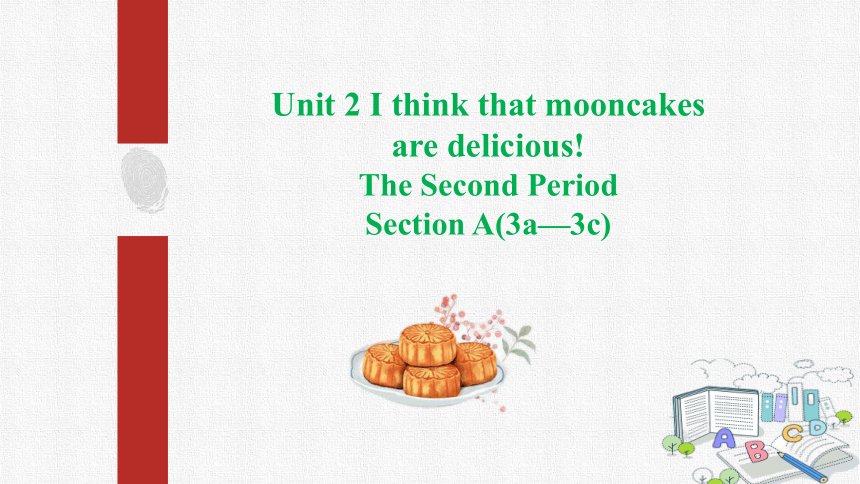 | |
| 格式 | pptx | ||
| 文件大小 | 3.2MB | ||
| 资源类型 | 教案 | ||
| 版本资源 | 人教新目标(Go for it)版 | ||
| 科目 | 英语 | ||
| 更新时间 | 2025-01-05 09:58:37 | ||
图片预览

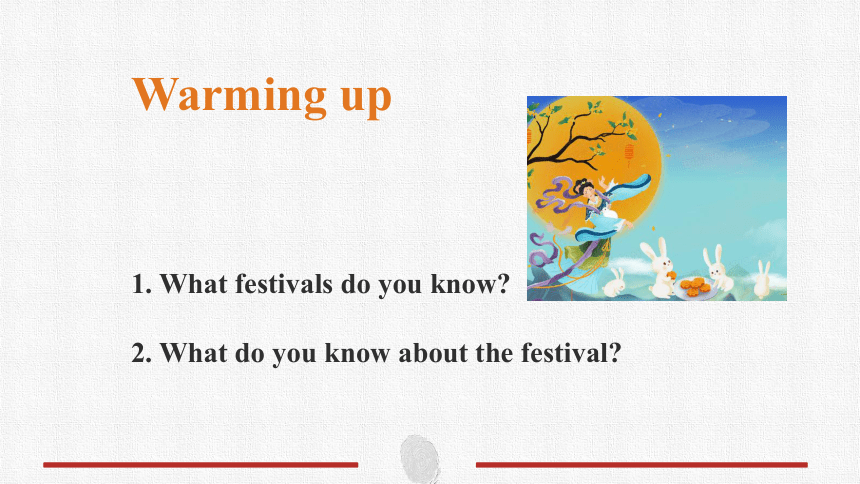
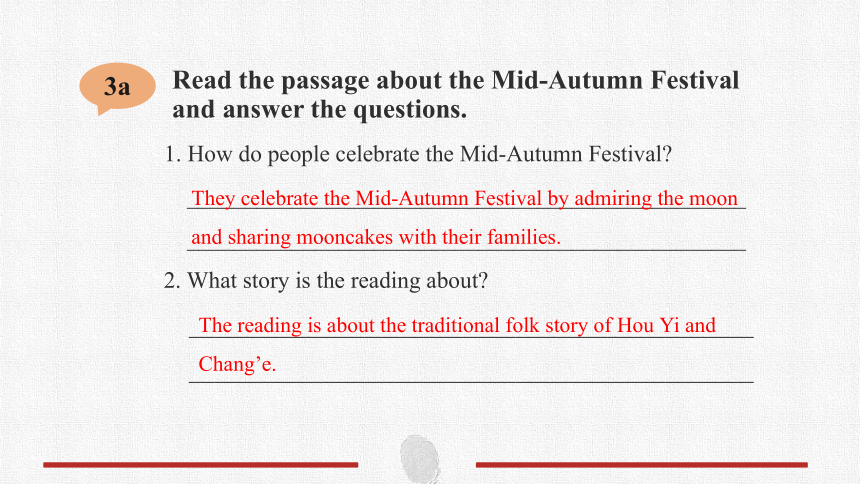
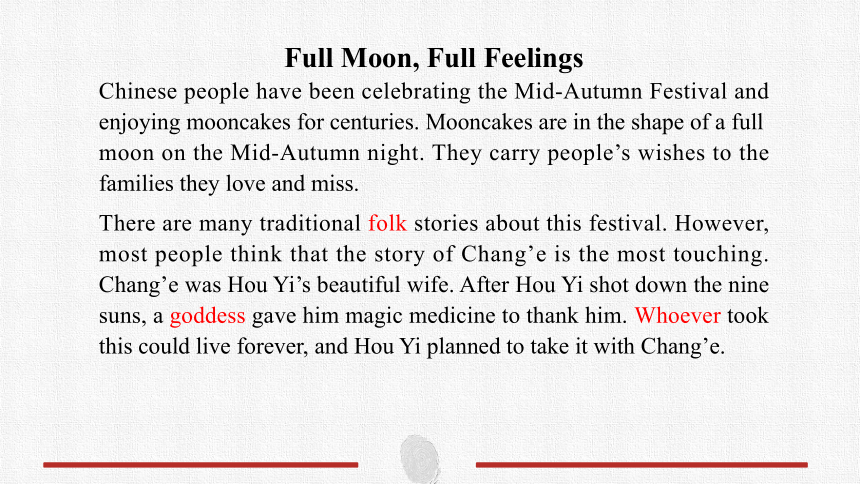
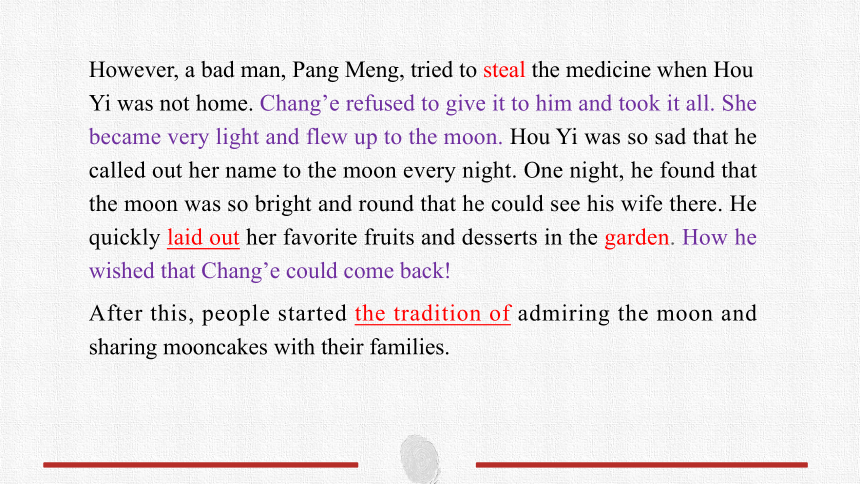
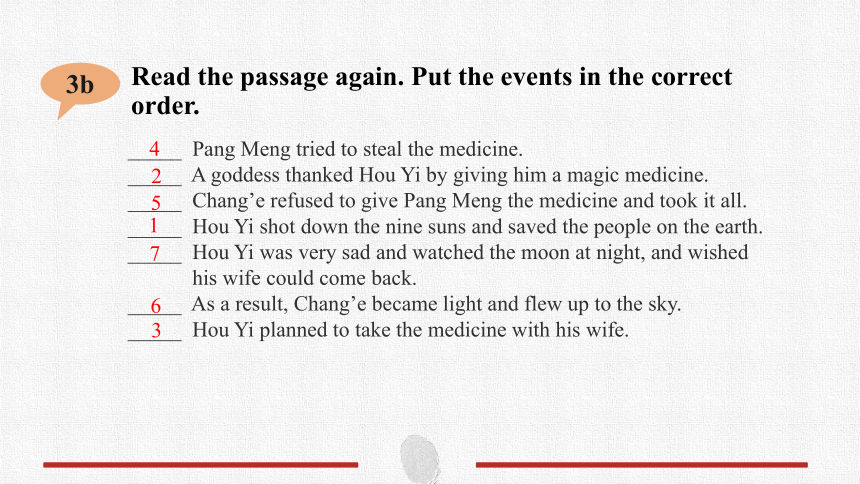
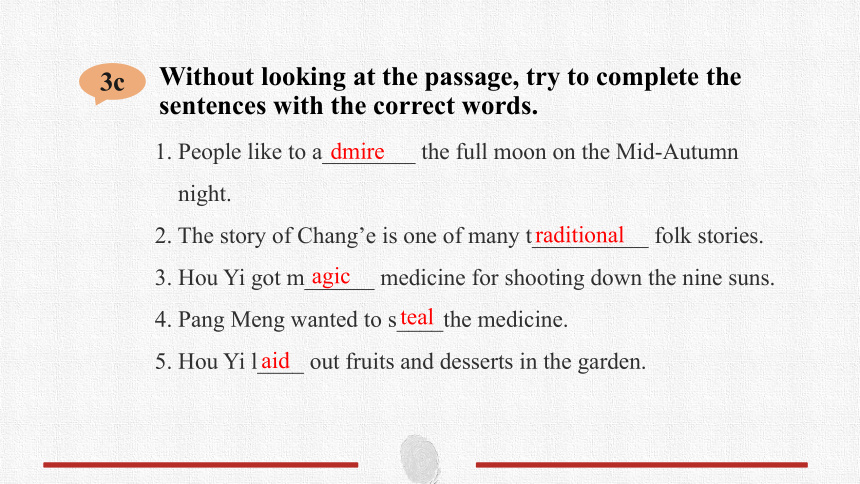
文档简介
(共15张PPT)
Unit 2 I think that mooncakes are delicious!
The Second Period
Section A(3a—3c)
Warming up
1. What festivals do you know
2. What do you know about the festival
Read the passage about the Mid-Autumn Festival and answer the questions.
1. How do people celebrate the Mid-Autumn Festival
________________________________________________
________________________________________________
2. What story is the reading about
_____________________________________________
_____________________________________________
3a
The reading is about the traditional folk story of Hou Yi and
Chang’e.
They celebrate the Mid-Autumn Festival by admiring the moon and sharing mooncakes with their families.
Full Moon, Full Feelings
Chinese people have been celebrating the Mid-Autumn Festival and enjoying mooncakes for centuries. Mooncakes are in the shape of a full moon on the Mid-Autumn night. They carry people’s wishes to the families they love and miss.
There are many traditional folk stories about this festival. However, most people think that the story of Chang’e is the most touching. Chang’e was Hou Yi’s beautiful wife. After Hou Yi shot down the nine suns, a goddess gave him magic medicine to thank him. Whoever took this could live forever, and Hou Yi planned to take it with Chang’e.
However, a bad man, Pang Meng, tried to steal the medicine when Hou Yi was not home. Chang’e refused to give it to him and took it all. She became very light and flew up to the moon. Hou Yi was so sad that he called out her name to the moon every night. One night, he found that the moon was so bright and round that he could see his wife there. He quickly laid out her favorite fruits and desserts in the garden. How he wished that Chang’e could come back!
After this, people started the tradition of admiring the moon and sharing mooncakes with their families.
Read the passage again. Put the events in the correct order.
_____ Pang Meng tried to steal the medicine.
_____ A goddess thanked Hou Yi by giving him a magic medicine.
_____ Chang’e refused to give Pang Meng the medicine and took it all.
_____ Hou Yi shot down the nine suns and saved the people on the earth.
_____ Hou Yi was very sad and watched the moon at night, and wished
his wife could come back.
_____ As a result, Chang’e became light and flew up to the sky.
_____ Hou Yi planned to take the medicine with his wife.
1
4
2
5
7
6
3
3b
Without looking at the passage, try to complete the sentences with the correct words.
1. People like to a________ the full moon on the Mid-Autumn
night.
2. The story of Chang’e is one of many t__________ folk stories.
3. Hou Yi got m______ medicine for shooting down the nine suns.
4. Pang Meng wanted to s____the medicine.
5. Hou Yi l____ out fruits and desserts in the garden.
dmire
agic
raditional
aid
teal
3c
1. Chang’e refused to give it to him and took it all. 嫦娥拒绝把仙药给
他并全部吞下了。(教材第11页)
refuse 动词,意为“拒绝,回绝,推却”。其后接动词不定式,即
refuse to do sth.,意为“拒绝做某事”。
e.g. They refused to let me go. 他们拒绝让我走。
Language Points
2. Hou Yi was so sad that he called out her name to the moon every
night. 后羿悲痛不已,以至于每晚都对着月亮大声呼喊她的名字。 (教材第11页)
call out one’s name 意为“大声呼喊某人的名字”。
e.g. I called out his name but he turned a deaf ear to my calling. 我大声 叫他的名字,但他不理我。
3. He quickly laid out her favorite fruits and desserts in the garden.
他 飞快地在花园里摆出她最喜欢的水果和点心。(教材第11页)
lay out 意为“摆开;布置”。lay在此处用作及物动词,意为“放
置;安放”。其过去式和过去分词均为 laid;现在分词为 laying。
e.g. Can you help her lay out the books on the shelf 你能帮她把这些
书摆放在书架上吗?
【拓展】
lay 作动词,还可译为“产(卵);下(蛋)”。
e.g. The hens lay a lot of eggs every day. 这些母鸡每天都下很多蛋。
4. How he wished that Chang’e could come back! 他是多么希望嫦娥
能回来呀!(教材第11页)
wish 及物动词,意为“希望”。
e.g. I wish to have a holiday. 我希望有一个假期。
We wish to live in a big house with a big garden. 我们希望住在一 所带有花园的大房子里。
5. After this, people started the tradition of admiring the moon and sharing mooncakes with their families. 此后,人们便开始了和家人一起赏月和品月饼的传统。(教材第11页)
(1) the tradition of … 意为“……的传统”。tradition 既可用作可数名词, 也可用作不可数名词,意为“传统;惯例”。其形容词形式为 traditional,意为“传统的”。
e.g. They value Chinese tradition. 他们尊重中国的传统。
(2) admire 及物动词,意为“欣赏;仰慕”。常用结构:
admire sb./sth.“欣赏某人/某事”;
admire sb. for (doing) sth.“因(做)某事佩服某人”。
e.g. ① I admire him very much. 我很钦佩他。
② We admire her for her bravery. 我们钦佩她的勇敢。
一、语篇填空之基础训练
1. _________ knew the thing should keep a secret.
2. The story of Chang’e is a traditional _______ story about the Mid-Autumn
Festival.
3. There are two beautiful __________ in our city. Many people visit them
every day.
4. Tom likes ________, especially ice-cream. But eating too much is not
good for his health.
Exercise
gardens
Whoever
folk
desserts
folk whoever dessert garden
二、用所给单词的适当形式填空
1. A young man _________ (steal) the lady’s wallet on the street just now.
2. She _________ (lay) the baby down lightly on the bed and left the room
quietly.
3. There are many beautiful _________ (tie) in our e and buy
one!
4. I ________ (admire) her when I first met her and I still think she’s smart.
stole
laid
ties
admired
1. Learn the new words and expressions by heart.
2. Retell the story of Chang’e.
Homework
Unit 2 I think that mooncakes are delicious!
The Second Period
Section A(3a—3c)
Warming up
1. What festivals do you know
2. What do you know about the festival
Read the passage about the Mid-Autumn Festival and answer the questions.
1. How do people celebrate the Mid-Autumn Festival
________________________________________________
________________________________________________
2. What story is the reading about
_____________________________________________
_____________________________________________
3a
The reading is about the traditional folk story of Hou Yi and
Chang’e.
They celebrate the Mid-Autumn Festival by admiring the moon and sharing mooncakes with their families.
Full Moon, Full Feelings
Chinese people have been celebrating the Mid-Autumn Festival and enjoying mooncakes for centuries. Mooncakes are in the shape of a full moon on the Mid-Autumn night. They carry people’s wishes to the families they love and miss.
There are many traditional folk stories about this festival. However, most people think that the story of Chang’e is the most touching. Chang’e was Hou Yi’s beautiful wife. After Hou Yi shot down the nine suns, a goddess gave him magic medicine to thank him. Whoever took this could live forever, and Hou Yi planned to take it with Chang’e.
However, a bad man, Pang Meng, tried to steal the medicine when Hou Yi was not home. Chang’e refused to give it to him and took it all. She became very light and flew up to the moon. Hou Yi was so sad that he called out her name to the moon every night. One night, he found that the moon was so bright and round that he could see his wife there. He quickly laid out her favorite fruits and desserts in the garden. How he wished that Chang’e could come back!
After this, people started the tradition of admiring the moon and sharing mooncakes with their families.
Read the passage again. Put the events in the correct order.
_____ Pang Meng tried to steal the medicine.
_____ A goddess thanked Hou Yi by giving him a magic medicine.
_____ Chang’e refused to give Pang Meng the medicine and took it all.
_____ Hou Yi shot down the nine suns and saved the people on the earth.
_____ Hou Yi was very sad and watched the moon at night, and wished
his wife could come back.
_____ As a result, Chang’e became light and flew up to the sky.
_____ Hou Yi planned to take the medicine with his wife.
1
4
2
5
7
6
3
3b
Without looking at the passage, try to complete the sentences with the correct words.
1. People like to a________ the full moon on the Mid-Autumn
night.
2. The story of Chang’e is one of many t__________ folk stories.
3. Hou Yi got m______ medicine for shooting down the nine suns.
4. Pang Meng wanted to s____the medicine.
5. Hou Yi l____ out fruits and desserts in the garden.
dmire
agic
raditional
aid
teal
3c
1. Chang’e refused to give it to him and took it all. 嫦娥拒绝把仙药给
他并全部吞下了。(教材第11页)
refuse 动词,意为“拒绝,回绝,推却”。其后接动词不定式,即
refuse to do sth.,意为“拒绝做某事”。
e.g. They refused to let me go. 他们拒绝让我走。
Language Points
2. Hou Yi was so sad that he called out her name to the moon every
night. 后羿悲痛不已,以至于每晚都对着月亮大声呼喊她的名字。 (教材第11页)
call out one’s name 意为“大声呼喊某人的名字”。
e.g. I called out his name but he turned a deaf ear to my calling. 我大声 叫他的名字,但他不理我。
3. He quickly laid out her favorite fruits and desserts in the garden.
他 飞快地在花园里摆出她最喜欢的水果和点心。(教材第11页)
lay out 意为“摆开;布置”。lay在此处用作及物动词,意为“放
置;安放”。其过去式和过去分词均为 laid;现在分词为 laying。
e.g. Can you help her lay out the books on the shelf 你能帮她把这些
书摆放在书架上吗?
【拓展】
lay 作动词,还可译为“产(卵);下(蛋)”。
e.g. The hens lay a lot of eggs every day. 这些母鸡每天都下很多蛋。
4. How he wished that Chang’e could come back! 他是多么希望嫦娥
能回来呀!(教材第11页)
wish 及物动词,意为“希望”。
e.g. I wish to have a holiday. 我希望有一个假期。
We wish to live in a big house with a big garden. 我们希望住在一 所带有花园的大房子里。
5. After this, people started the tradition of admiring the moon and sharing mooncakes with their families. 此后,人们便开始了和家人一起赏月和品月饼的传统。(教材第11页)
(1) the tradition of … 意为“……的传统”。tradition 既可用作可数名词, 也可用作不可数名词,意为“传统;惯例”。其形容词形式为 traditional,意为“传统的”。
e.g. They value Chinese tradition. 他们尊重中国的传统。
(2) admire 及物动词,意为“欣赏;仰慕”。常用结构:
admire sb./sth.“欣赏某人/某事”;
admire sb. for (doing) sth.“因(做)某事佩服某人”。
e.g. ① I admire him very much. 我很钦佩他。
② We admire her for her bravery. 我们钦佩她的勇敢。
一、语篇填空之基础训练
1. _________ knew the thing should keep a secret.
2. The story of Chang’e is a traditional _______ story about the Mid-Autumn
Festival.
3. There are two beautiful __________ in our city. Many people visit them
every day.
4. Tom likes ________, especially ice-cream. But eating too much is not
good for his health.
Exercise
gardens
Whoever
folk
desserts
folk whoever dessert garden
二、用所给单词的适当形式填空
1. A young man _________ (steal) the lady’s wallet on the street just now.
2. She _________ (lay) the baby down lightly on the bed and left the room
quietly.
3. There are many beautiful _________ (tie) in our e and buy
one!
4. I ________ (admire) her when I first met her and I still think she’s smart.
stole
laid
ties
admired
1. Learn the new words and expressions by heart.
2. Retell the story of Chang’e.
Homework
同课章节目录
- Unit 1 How can we become good learners.
- Section A
- Section B
- Unit 2 I think that mooncakes are delicious!
- Section A
- Section B
- Unit 3 Could you please tell me where the restroom
- Section A
- Section B
- Unit 4 I used to be afraid of the dark.
- Section A
- Section B
- Unit 5 What are the shirts made of?
- Section A
- Section B
- Review of Units 1-5
- Unit 6 When was it invented?
- Section A
- Section B
- Unit 7 Teenagers should be allowed to choose their
- Section A
- Section B
- Unit 8 It must belong to Carla.
- Section A
- Section B
- Unit 9 I like music that I can dance to.
- Section A
- Section B
- Unit 10 You're supposed to shake hands.
- Section A
- Section B
- Review of Units 6-10
- Unit 11 Sad movies make me cry.
- Section A
- Section B
- Unit 12 Life is full of the unexpected
- Section A
- Section B
- Unit 13 We're trying to save the earth!
- Section A
- Section B
- Unit 14 I remember meeting all of you in Grade 7.
- Section A
- Section B
- Review of Units 11-14
